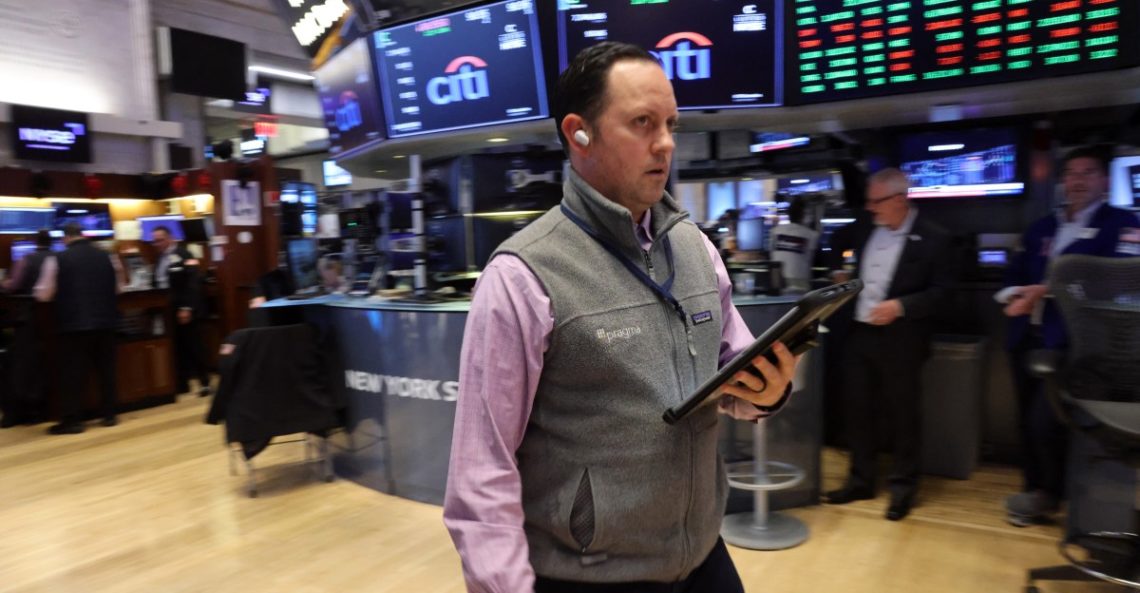It’s getting harder to find a job and easier to lose one.
Employers are hiring workers at a steadily lower rate while laying them off at a rising one, according to data from the Chicago Federal Reserve. The unemployment rate has been ticking up, and job growth has been slowing.
This said, our picture of today’s labor market is blurry. With the government shut down since October 1, our best economic data is out of date. But this week brought large layoffs at a long list of major companies. About 14,000 workers were let go from Amazon, 48,000 from UPS, 25,000 from Intel, 15,000 from Microsoft, and 11,00 from Accenture.
And yet, even as corporate America rains pink slips on its workforces, stocks keep hitting record highs.
This disconnect may seem curious. After all, slowing job growth can be indicative of an impending recession. And when people lose their jobs during a downturn, they have less money to spend on goods and services — which translates into weaker profits for corporations.
Conversely, if companies’ stocks are doing gangbusters, you’d think they’d feel less pressure to cut jobs.
So, what explains why the labor market looks ominous, even as Americans’ 401(k)s look splendid?
There are two primary reasons:
1) Wall Street can enjoy a little unemployment, as a treat
To an extent, stocks aren’t doing well despite the slowdown in job growth but because of it.
Recessions are bad for stock values. But a small uptick in unemployment can actually be good for them — at least, at a time of elevated inflation.
This is largely because of how Federal Reserve policy influences the stock market.
America’s central bank has a dual mandate: to promote price stability and full employment. Specifically, the Fed aims to keep the inflation rate at about 2 percent.
When the Fed is primarily worried about inflation, it raises interest rates, which reduces economic demand, and therefore, prices. When the central bank is more concerned about unemployment, it cuts rates, which boosts economic demand and nudges prices upward.
To understand these dynamics, picture the economy as one enormous auction in which consumers and businesses bid against each other for access to scarce labor and resources. If interest rates are low, then everyone can borrow money on the cheap. This helps them bid the price of all auctioned items higher. When rates go up, however, borrowing gets more expensive. Suddenly, everyone has less cash in their pockets. So, they can’t bid prices up as high.
Currently, inflation in the US is running at about a 3 percent pace. If the labor market were in perfect shape, the Fed might therefore raise interest rates to bring prices down. By contrast, the more fragile the employment situation looks, the more likely the central bank will be to cut interest rates. This is because a weak labor market raises the probability of a recession and reduces the risk of inflation. (When Americans lose their jobs, they spend less money, which reduces demand, and therefore, price pressures.)
These dynamics matter for stocks. When interest rates rise, equity values generally fall.
To understand why, imagine an investor, Ms. Moneybags, who has $100 in capital. On Monday, she can choose between putting her cash into the S&P 500 or a Treasury bond. The first is risky — technically, one can lose everything on stocks — but the index has historically offered an average annual return of above 7 percent. A Treasury bond, meanwhile, entails essentially zero risk. But, in this hypothetical, it offers only a 3 percent return.
Given this balance of risks and rewards, Ms. Moneybags will put almost all of her cash — say, $85 — into stocks. And lots of other investors are inclined to do the same. In the process, they all bid up the price of equities.
Yet, if the Fed raises interest rates the next day — and, now, a Treasury bond offers a 5 percent risk-free return — then, suddenly, stocks become a bit less appealing. Ms. Moneybags might want to shift $25 of her savings out of equities and into bonds. As other investors follow suit, the stock market falls.
On the other hand, if the Fed cuts rates — Treasuries currently offer a measly 2 percent return — Ms. Moneybags will sell her bonds and put all $100 into stocks. And other investors will also direct capital away from Treasuries and towards equities, bidding up the S&P 500’s value.
Thus, slight weakening in the labor market can make the Fed more likely to cut rates and less likely to raise them, which makes stocks more attractive, raising their value.
In today’s context, with inflation running at 3 percent, a small spike in unemployment might be especially pleasing to markets, since the Fed would be liable to raise rates in the absence of such bad labor market news. With job growth wobbly, by contrast, the Fed might be inclined to slash rates, despite elevated inflation.
And, in fact, this is precisely what the central bank did on Wednesday, reducing benchmark interest rates by 0.25 percentage points.
2) Global tech companies dominate the stock market — and aren’t that dependent on American consumers
Seven technology-centric titans — Apple, Amazon, Alphabet, Meta, Microsoft, Nvidia, and Tesla — now account for roughly 37 percent of the S&P 500’s total value.
Meanwhile, the 10 largest AI-related stocks contributed nearly half of the S&P’s entire year-to-date return between January and late August, according to a report from BCA Research.
In other words: The stock market’s overall value now largely hinges on the performance of a small number of large tech companies, particularly those involved in AI.
And the value of these firms is largely insulated from modest increases in American unemployment. Meta, Apple, Alphabet, and Nvidia make most of their sales abroad. Microsoft, Amazon, and other tech giants also collect vast amounts of foreign revenue. For this reason, if slightly more Americans are jobless — and thus, US consumers have a bit less money to spend — that is not going to take a huge bite out of these tech firms’ profitability.
More fundamentally, the value of all firms – but especially those at the tech frontier, like AI companies – is not determined solely by their near-term revenues.
When you buy a stock, you are purchasing a claim on a company’s future cash flows. If an enterprise is unprofitable today but has a plausible path to generating windfall returns five years from now, then its shares are highly valuable, no matter what the next year or two hold. Therefore, even if America experiences a recession in the next year, that wouldn’t necessarily have a huge impact on the value of Alphabet’s shares. Even if the company’s ad sales take a short-term hit during an economic downturn, its future profits will hinge much more on whether its AI business flourishes over the coming decade.
Furthermore, as tech giants race each other for AI supremacy, they are throwing enormous sums of money at companies that supply the inputs needed for artificial intelligence, such as the chipmaker Nvidia. And these AI suppliers have almost no direct dependence on the American consumer. Their revenues are driven by the capital spending of hyperscaling AI companies, not the consumption of American workers.
Wall Street’s optimism is explicable (but not necessarily rational)
Put all this together, and the disparate trajectories of America’s labor market and stock indices become less paradoxical. Investors are wagering that we’re in for a modest rise in unemployment, not a deep recession. And a slightly weaker labor market is likely to mean lower interest rates and inflation, which is good for stock values.
Meanwhile, the companies fueling the stock market’s growth aren’t especially sensitive to near-term changes in American consumer demand. Their value is much more tied up in whether Silicon Valley successfully manufacturers a superintelligent machine over the next decade.
All this said, investors could still be badly wrong. America could be sliding towards a prolonged stagflation that keeps interest rates elevated and profits low, even for AI companies. After all, a slowdown in the US can spread globally. And many artificial intelligence firms are banking on massive revenue growth in the next five years. If consumers have less disposable income to spend on chatbot subscriptions, that could put a dent in OpenAI’s plans for global domination.
More generally, AI might turn out to be a radically less profitable technology than Wall Street has assumed.
Finally, the fact that an economically illiterate authoritarian is consolidating power over the US government — while sabotaging its international credibility and domestic functioning — might have negative implications for American business in the long-term.
For now, though, investors seem to doubt that.
The post The job market is getting worse. So why are stocks booming? appeared first on Vox.




